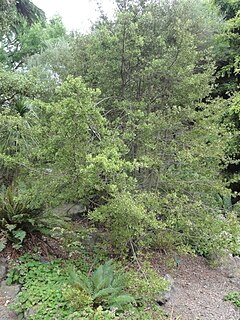
Aster is a genus of perennial flowering plants in the family Asteraceae. Its circumscription has been narrowed, and it now encompasses around 170 species, all but one of which are restricted to Eurasia; many species formerly in Aster are now in other genera of the tribe Astereae. Aster amellus is the type species of the genus and the family Asteraceae.

Phyllocladus, the celery pines, is a small genus of conifers, now usually treated in the family Podocarpaceae.Species occur mainly in New Zealand, Tasmania, and Malesia in the Southern Hemisphere, though P. hypophyllus ranges into the Philippines, a short way north of the equator.

Astragalus is a large genus of over 3,000 species of herbs and small shrubs, belonging to the legume family Fabaceae and the subfamily Faboideae. It is the largest genus of plants in terms of described species. The genus is native to temperate regions of the Northern Hemisphere. Common names include milkvetch, locoweed and goat's-thorn. Some pale-flowered vetches are similar in appearance, but they are more vine-like than Astragalus.

Salvelinus is a genus of salmonid fish often called char or charr; some species are called "trout". Salvelinus is a member of the subfamily Salmoninae within the family Salmonidae. The genus has a northern circumpolar distribution, and most of its members are typically cold-water fish that primarily inhabit fresh waters. Many species also migrate to the sea.

Tetrapanax papyrifer, the rice-paper plant, is an evergreen shrub in the family Araliaceae, the sole species in the genus Tetrapanax. The specific epithet is frequently misspelled as "papyriferum", "papyriferus", or "papyrifera". It is endemic to Taiwan, but widely cultivated in East Asia and sometimes in other tropical regions as well. The species was once included in the genus Fatsia as Fatsia papyrifera.
Starflower or star flower may refer to:

The Clachan Bridge is a simple, single-arched, hump-backed, masonry bridge spanning the Clachan Sound, 13 kilometres (8 mi) southwest of Oban in Argyll, Scotland. It links the west coast of the Scottish mainland to the island of Seil.

Arion is a genus of air-breathing land slugs in the family Arionidae, the roundback slugs. Most species of this Palearctic genus are native to the Iberian Peninsula.

Erinus alpinus, the fairy foxglove, alpine balsam, starflower, or liver balsam, is a species of flowering plant in the family Plantaginaceae, native to Central and Southern Europe.

Lobelia erinus is a species of flowering plant in the bellflower family Campanulaceae, native to southern Africa.

Aster alpinus, the alpine aster or blue alpine daisy, is a species of flowering plant in the family Asteraceae, native to the mountains of Europe, with a subspecies native to Canada and the United States. This herbaceous perennial has purple, pink, or blue flowers in summer.

The alpine chipmunk is a species of chipmunk native to the high elevations of the Sierra Nevada of California.

Melicytus is a genus of flowering plants in the family Violaceae. Hymenanthera is a synonym.

The Circumboreal Region in phytogeography is a floristic region within the Holarctic Kingdom in Eurasia and North America, as delineated by such geobotanists as Josias Braun-Blanquet and Armen Takhtajan.
E. americanus may refer to:

The Lautaret Alpine Garden is an alpine botanical garden located at 2100 metres altitude in the Col du Lautaret of the Dauphiné Alps, near Villar-d'Arêne, Hautes-Alpes, Provence-Alpes-Côte d'Azur, France. It is part of the List of Remarkable Gardens of France certified by the Ministry of Culture (France).
Toiyabea is a genus of North American plants in the aster tribe within the daisy family. The genus is named for the Toiyabe Mountains in the US state of Nevada. The only known species is Toiyabea alpina, the alpine serpentweed, native to the Toiyabe and Toquima Mountains of central Nevada.

The Alps are one of the great mountain range systems of Europe stretching approximately 1,200 kilometres (750 mi) across eight Alpine countries from Austria and Slovenia in the east, Switzerland, Liechtenstein, Germany, France to the west and Italy and Monaco to the south. The flora of the Alps are diverse. In the mountains, the vegetation gradually changes with altitude, sun exposure, and location on the mountain. There are five successive life zones, each with distinct landscapes and vegetation characteristics: premontane, montane, subalpine, alpine, and alvar.

Seorsumuscardinus is a genus of fossil dormice from the early Miocene of Europe. It is known from zone MN 4 in Oberdorf, Austria; Karydia, Greece; and Tägernaustrasse-Jona, Switzerland, and from zone MN 5 in a single site at Affalterbach, Germany. The MN 4 records are placed in the species S. alpinus and the sole MN 5 record is classified as the species S. bolligeri. The latter was placed in a separate genus, Heissigia, when it was first described in 2007, but it was reclassified as a second species of Seorsumuscardinus in 2009.

Campanula erinus is a species of annual herb in the genus Campanula (bellflowers). They have a self-supporting growth form. Individuals can grow to 11 cm tall.

















